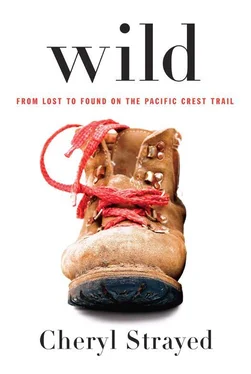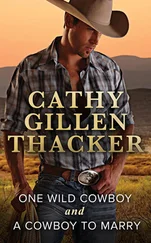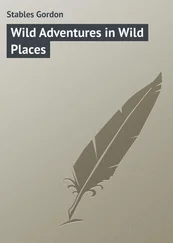Cheryl Strayed - Wild
Здесь есть возможность читать онлайн «Cheryl Strayed - Wild» весь текст электронной книги совершенно бесплатно (целиком полную версию без сокращений). В некоторых случаях можно слушать аудио, скачать через торрент в формате fb2 и присутствует краткое содержание. Год выпуска: 2012, ISBN: 2012, Жанр: Современная проза, на английском языке. Описание произведения, (предисловие) а так же отзывы посетителей доступны на портале библиотеки ЛибКат.
- Название:Wild
- Автор:
- Жанр:
- Год:2012
- ISBN:978-0-307-95765-8
- Рейтинг книги:4 / 5. Голосов: 1
-
Избранное:Добавить в избранное
- Отзывы:
-
Ваша оценка:
- 80
- 1
- 2
- 3
- 4
- 5
Wild: краткое содержание, описание и аннотация
Предлагаем к чтению аннотацию, описание, краткое содержание или предисловие (зависит от того, что написал сам автор книги «Wild»). Если вы не нашли необходимую информацию о книге — напишите в комментариях, мы постараемся отыскать её.
Wild — читать онлайн бесплатно полную книгу (весь текст) целиком
Ниже представлен текст книги, разбитый по страницам. Система сохранения места последней прочитанной страницы, позволяет с удобством читать онлайн бесплатно книгу «Wild», без необходимости каждый раз заново искать на чём Вы остановились. Поставьте закладку, и сможете в любой момент перейти на страницу, на которой закончили чтение.
Интервал:
Закладка:
“I might stay in a motel for the night,” I told him.
“Don’t do that!” he bellowed. “I did that and they put me in jail.”
I nodded, realizing that he thought that I was like him. A drifter. An outlaw. Not a so-called college girl, or even a former one. I didn’t even try to explain about the PCT.
“You can have this,” he said, holding the paper bag out to me. “It’s bread and bologna. You can make sandwiches.”
“No, thanks,” I said, both repulsed and touched by his offer.
“Where you from?” he asked, reluctant to ride away.
“Minnesota.”
“Hey!” he cried, a smile spreading across his grubby face. “You’re my sister. I’m from Illinois. Illinois and Minnesota are like neighbors.”
“Well, almost neighbors — there’s Wisconsin in between,” I said, and instantly regretted it, not wanting to hurt his feelings.
“But that’s still neighbors,” he said, and held his open palm down low so I would give him five.
I gave him five.
“Good luck,” I said to him as he pedaled away.
I walked to a grocery store and wandered up and down the aisles before touching anything, dazzled by the mountains of food. I bought a few things to replace the food I’d eaten when I hadn’t been able to make my dehydrated dinners and walked along a busy thruway until I found what looked like the cheapest motel in town.
“My name’s Bud,” the man behind the counter said when I asked for a room. He had a hangdog expression and a smoker’s cough. Tan jowls hung off the sides of his wrinkled face. When I told him about hiking the PCT, he insisted on washing my clothes. “I can just throw them in with the sheets and towels, darling. It ain’t nothing at all,” he said when I protested.
I went to my room, stripped, and put on my rainpants and raincoat, though it was a hot June day; then I walked back to the office and handed my little pile of dirty clothes shyly over to Bud, thanking him again.
“It’s ’cause I like your bracelet. That’s why I offered,” said Bud. I pulled up the sleeve of my raincoat and we looked at it. It was a faded silver cuff, a POW/MIA bracelet my friend Aimee had clamped onto my wrist as we said goodbye on a street in Minneapolis weeks before.
“Let me see who you got there.” He reached across the counter and took my wrist and turned it so he could read the words. “William J. Crockett,” he said, and let go. Aimee had done some research and told me who William J. Crockett was: an air force pilot who’d been two months shy of his twenty-sixth birthday when his plane was shot down in Vietnam. She’d worn the bracelet for years without ever taking it off. Since the moment she’d given it to me, neither had I. “I’m a Vietnam vet myself, so I keep my eyes out for that sort of thing. That’s also why I gave you the only room we got that has a tub,” said Bud. “I was there in ’63, when I was barely eighteen. But now I’m against war. All kinds of war. One hundred percent against it. Except in certain cases.” There was a cigarette burning in a plastic ashtray nearby that Bud picked up but didn’t bring to his lips. “So I’m gonna assume you know there’s a lot of snow up there on the Sierra Nevada this year.”
“Snow?” I asked.
“It’s been a record year. Entirely socked in. There’s a BLM office here in town if you want to call them and ask about conditions,” he said, and took a drag. “I’ll have your clothes ready in an hour or two.”
I returned to my room and took a shower and then a bath. Afterwards, I pulled back the bedspread and lay on the bedsheets. My room didn’t have an air conditioner, but I felt cool anyway. I felt better than I’d ever felt in all of my life, now that the trail had taught me how horrible I could feel. I got up, rummaged through my pack, then reclined on the bed and read As I Lay Dying while Bud’s words about the snow thrummed through me.
I knew snow. I had grown up in Minnesota, after all. I’d shoveled it, driven in it, and balled it up in my hands to throw. I’d watched it through windows for days as it fell into piles that stayed frozen for months on the ground. But this snow was different. It was snow that covered the Sierra Nevada so indomitably that the mountains had been named for it — in Spanish, Sierra Nevada means “the snowy range.”
It seemed absurd to me that I’d been hiking in that snowy range all along — that the arid mountains I’d traversed since the moment I set foot on the PCT were technically part of the Sierra Nevada. But they weren’t the High Sierras — the formidable range of granite peaks and cliffs beyond Kennedy Meadows that mountaineer and writer John Muir had famously explored and adored more than a hundred years before. I hadn’t read Muir’s books about the Sierra Nevada before I hiked the PCT, but I knew he was the founder of the Sierra Club. Saving the Sierra Nevada from sheepherders, mining operations, tourist development, and other encroachments of the modern age had been his lifelong passion. It’s thanks to him and those who supported his cause that most of the Sierra Nevada is still wilderness today. Wilderness that was now apparently snowbound.
I wasn’t entirely taken by surprise. The authors of my guidebook had warned me about the snow I might encounter in the High Sierras, and I’d come prepared. Or at least the version of prepared I’d believed was sufficient before I began hiking the PCT: I’d purchased an ice ax and mailed it to myself in the box I would collect at Kennedy Meadows. It had been my assumption when I purchased the ice ax that I’d need it only occasionally, for the highest stretches of trail. The guidebook assured me that in a regular year most of the snow would be melted by the time I hiked the High Sierras in late June and July. It hadn’t occurred to me to investigate whether this had been a regular year.
I found a phone book in the bedside table and paged through it, then dialed the number for the local office of the Bureau of Land Management.
“Oh, yes, there’s lots of snow up there,” said the woman who answered. She didn’t know the specifics, she told me, but she knew for certain it had been a record year for snowfall in the Sierras. When I told her I was hiking the PCT, she offered to give me a ride to the trail. I hung up the phone feeling more relieved that I didn’t have to hitchhike than worried about the snow. It simply seemed so far away, so impossible.
The kind woman from the BLM brought me back to the trail at a place called Walker Pass the next afternoon. As I watched her drive away, I felt both chastened and slightly more confident than I had nine days before when I’d begun my hike. In the previous days, I’d been charged by a Texas longhorn bull, torn and bruised by falls and mishaps, and had navigated my way down a remote road past a mountain that was soon to be blown up. I’d made it through miles of desert, ascended and descended countless mountains, and gone days without seeing another person. I’d worn my feet raw, chafed my body until it bled, and carried not only myself over miles of rugged wilderness, but also a pack that weighed more than half of what I did. And I’d done it alone.
That was worth something, right? I thought as I walked through the rustic campground near Walker Pass and found a place to camp. It was late but still light, June in the last week of spring. I pitched my tent and cooked my first hot meal on the trail on my newly functioning stove — dried beans and rice — and watched the sky’s light fade in a brilliant show of colors over the mountains, feeling like the luckiest person alive. It was fifty-two miles to Kennedy Meadows, sixteen to my first water on the trail.
In the morning, I loaded my pack with another full supply of water and crossed Highway 178. The next road that crossed the Sierra Nevada was 150 as-the-crow-flies miles north, near Tuolumne Meadows. I followed the PCT along its rocky, ascendant course in the hot morning sun, catching views of the mountains in all directions, distant and close — the Scodies to the near south, the El Paso Mountains far off to the east, the Dome Land Wilderness to the northwest, which I’d reach in a few days. They all looked the same to me, though each was subtly different. I’d become used to having mountains constantly in sight; my vision had changed over the past week. I’d adjusted to the endless miles-long panoramas; become familiar with the perception that I was walking on the land in the very place where it met the sky. The crest.
Читать дальшеИнтервал:
Закладка:
Похожие книги на «Wild»
Представляем Вашему вниманию похожие книги на «Wild» списком для выбора. Мы отобрали схожую по названию и смыслу литературу в надежде предоставить читателям больше вариантов отыскать новые, интересные, ещё непрочитанные произведения.
Обсуждение, отзывы о книге «Wild» и просто собственные мнения читателей. Оставьте ваши комментарии, напишите, что Вы думаете о произведении, его смысле или главных героях. Укажите что конкретно понравилось, а что нет, и почему Вы так считаете.












